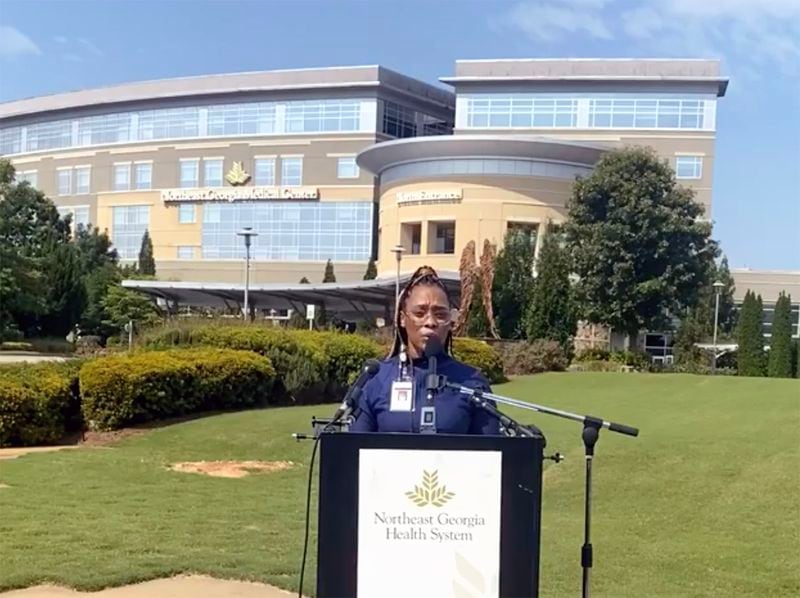The vast majority of those hospitalized were not vaccinated, hospital officials said. That is discouraging nurses and others hospital staff who say a surge could have been prevented had more people opted for the vaccine.

Paul P. Hinchey, president and CEO at St. Joseph’s/Candler health system in Savannah, GA (Photo courtesy of St. Joseph’s/Candler)
“Caregivers feel betrayed,’’ said Paul P. Hinchey, president and CEO at St. Joseph’s/ Candler Health System in Savannah. “These caregivers, if you come into any of the hospitals in this state and you go through the windshield of your car or you have a heart attack or you cut yourself or you fall out of a tree, they are all over you … Their empathy is through the roof … But we’ve got to help them.”
Elizabeth Larkins, executive director of medical nursing at Northeast Georgia Health System, said her teams of nurses and respiratory therapists are exhausted.
“Our staff that are in the front lines are still recovering from the mental and emotional strain of the past 18 months,” Larkins said, while trying to hold holding back tears at a Monday press conference in Gainesville. “Many of them tell me they don’t know if they can take another surge.”
Some are leaving health care, as hospitals struggle to maintain enough staff. Northeast Georgia Health System has turned to agencies to try to find 550 registered nurses to meet demand and to fill empty spots.
Meanwhile, beds are filling up with COVID-l19 patients, and late afternoon Monday many emergency rooms all over the state were urging ambulances to take patients elsewhere. They included a number of facilities in metro Atlanta, including Wellstar Kennestone Hospital, Wellstar Atlanta Medical Center, Grady Health System and Emory University Hospital, according to the Georgia Coordinating Center.
As the highly contagious delta variant of the coronavirus spreads, one major concern among health care providers is the spike in cases among younger adults in a state with relatively low vaccination rates.
Previous waves of the disease were most devastating to those 65 and older. But that is the population in Georgia with the highest vaccination rates. Rates among younger adults are much lower, and no vaccine has been authorized for those under age 12. Overall, only about 40% of Georgians have been fully vaccinated, compared with 50% across the U.S.
Half of the COVID-19 patients at Northeast Georgia Health System are under age 60, said Dr. Erine Raybon-Rojas, a critical care physician.
“We have cared for some as young as 18 in the past two weeks,” said Dr. Deepak Aggarwal, who heads the medical staff.
At Memorial Health in Savannah, the average age is even lower: 50, said Thacker, who is a pediatric infectious disease specialist.
Though the number of children hospitalized for COVID-19 remains very low, pediatricians are concerned about the risk of infection as students return to classrooms amid a fourth wave of the virus.
Clinics at Children’s Healthcare of Atlanta have seen an increase in the number of children testing positive, but symptoms have generally been mild and the children didn’t require hospital care. At present, 10 patients are hospitalized with the disease, a spokeswoman said.
Dr. Hugo Scornik, president of the Georgia chapter of the American Academy of Pediatrics, said that while the rate of infection among children has been small, there could be a rise in more serious cases in the latest surge.
Scornik, who is a pediatrician in Conyers, urged parents to mask up their children before they attend in-person school, especially youngsters under 12 who have no vaccine.
“This is the best way to prevent catching the delta variant of COVID,” Scornik told the AJC.
Many healthcare officials fear Georgia could be headed in the direction of states like Mississippi, Missouri, Louisiana and Florida, where significant outbreaks have filled ICUs.
During the seven-day period that ended July 28, Georgia reported 18,619 new confirmed cases — a 91% jump over the same period the previous week, according to the U.S. Centers for Disease Control and Prevention. Over that same period, Fulton County saw an increase of 96%; DeKalb, 76%; Cobb, 82%; Clayton, 112%; Hall, 108%; and Chatham, 120%, according to the CDC.
All but a dozen Georgia counties meet the threshold of substantial or high community transmission of the coronavirus, and the state’s community transmission level has moved to high from substantial just days ago.
Monday, Georgia reported 4,387 new confirmed cases, 151 new hospitalizations and 21 additional deaths, according to the Georgia Department of Public Health.

At a news conference Monday in Gainesville, Dr. Erine Raybon-Rojas, a critical care physician at North Georgia Medical Center, urged people to get vaccinated as COVID-19 hospitalizations spike. (NGMC Facebook livestream)
At Monday’s press conference in Gainesville, Larkins and the NGHS physicians urged unvaccinated Georgians to do their part in helping stop the spread of the virus. The health system’s models project that cases will continue to rise until a peak in early September.
“If you are not concerned for your health enough to go get the vaccine, I’m asking you to please do it for people in your life that you love, do it for our healthcare workers, do it for your community,” Larkins said.
That is not meant to spark fear, said Raybon-Rojas, the critical care physician. “It’s meant to give important information and data so you can make an informed decision right now and the most important decision for us is to get vaccinated.”
Staff writer Helena Oliviero contributed to this article.